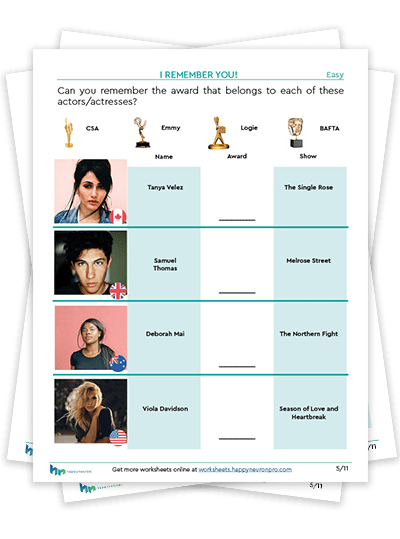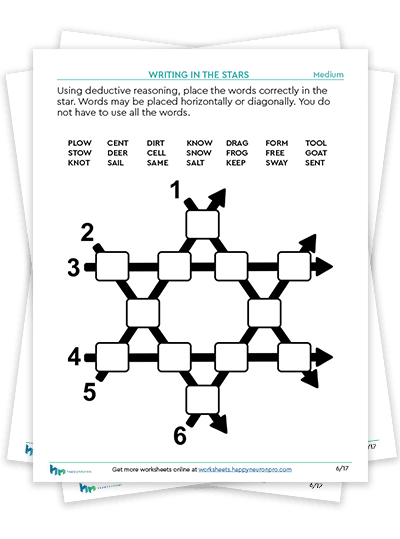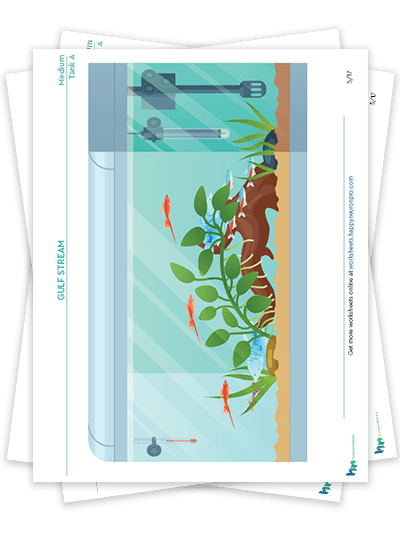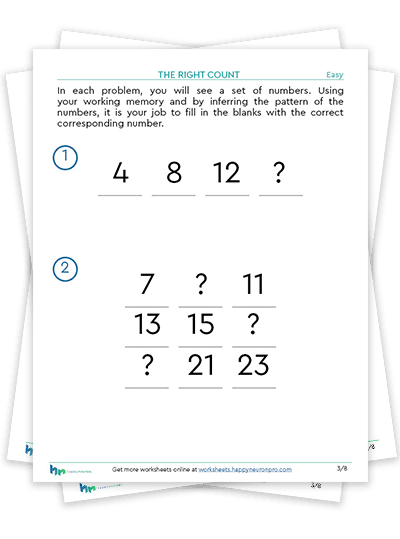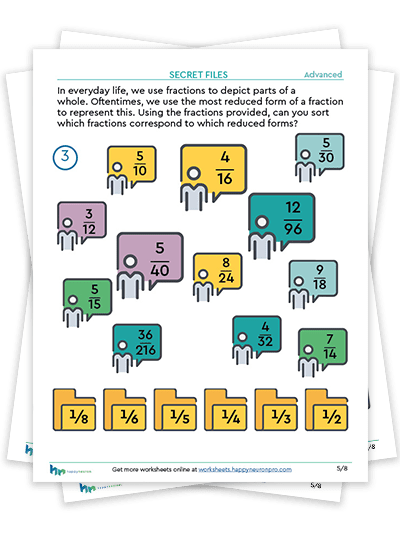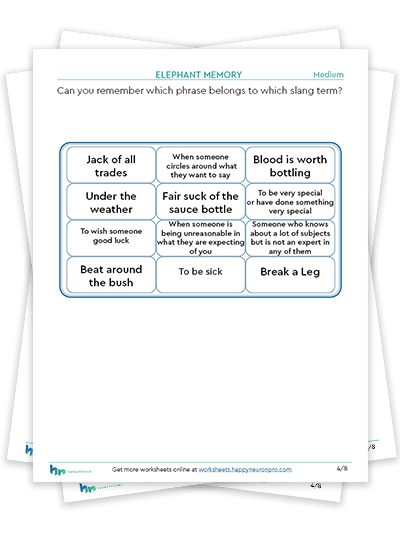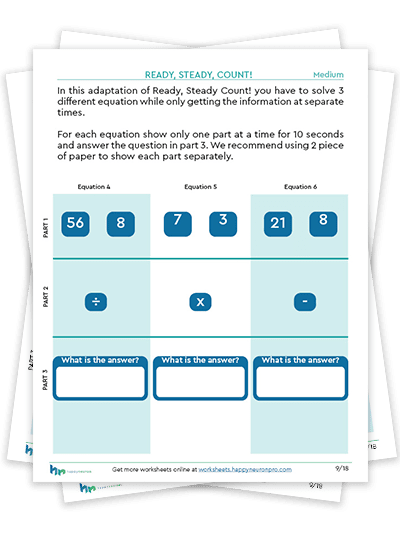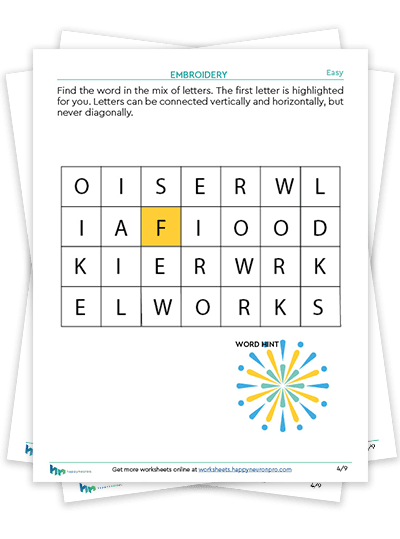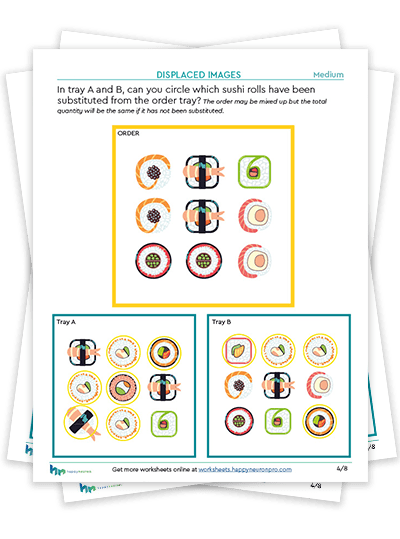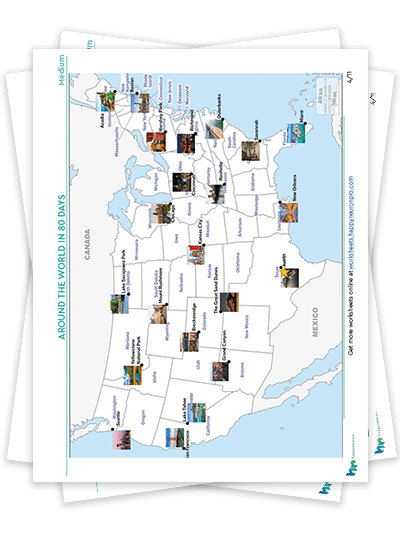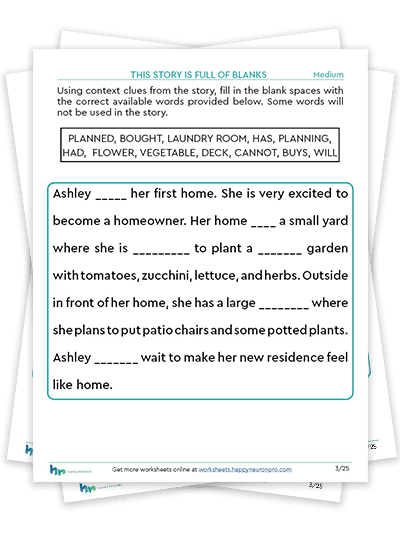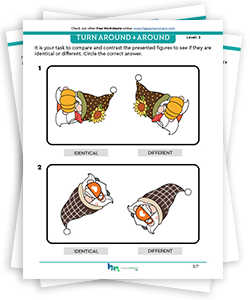Worksheets for ABA
Our Worksheets are Perfect for Behavioral Therapy!
Welcome to HappyNeuron Pro, your trusted partner in cognitive activity for therapy! We are excited to introduce you to our extensive collection of ABA worksheets, designed to empower clinicians to save time building therapy programs.
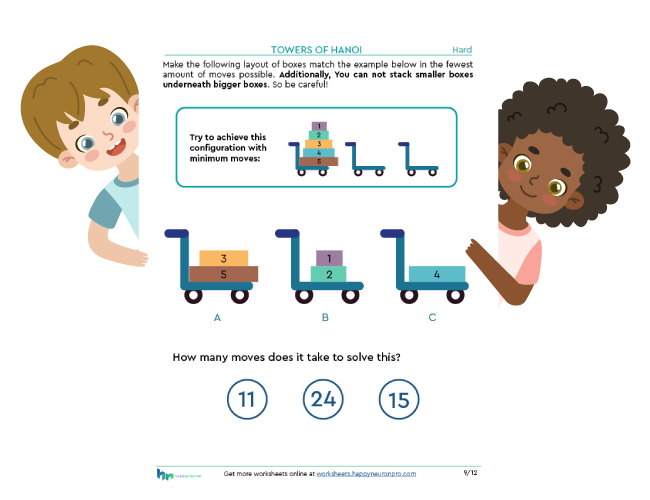
Filters
Memory
Language
Attention
Processing speed
Visual-spatial
Executive functions
Social cognition
Math and computational
Kids
Hybrid
Themed
Not purchased yet
We release 2 free mini packets a month. Join the newsletter and download them now!
Sort by
Prepare for a cinematic adventure at an international film awards show with our engaging worksheet! As you immerse yourself in the glitz and glamour of the event, you’ll be tasked with remembering verbal and visual information related to the various awards and their recipients. This exercise is a valuable opportunity to hone your memory skills and develop strategies for recalling specific details in a given context.
From the names of the awards to the individuals who receive them, this worksheet will challenge you to retain and recall intricate details associated with each prestigious honor. By practicing this exercise, you’ll enhance your ability to remember verbal and visual information and refine your overall memory recall strategies.
Join us on this cinematic journey and discover the thrill of remembering key details amidst the excitement of an international film awards ceremony. With popcorn in hand and your memory skills ready, you will surely enjoy this immersive and entertaining activity.
Our digital exercise, “I Remember You,” inspired this mini. From recalling names and faces, everyone uses this activity daily.
Use the worksheets in this packet to help practice inference skills. Your patient must use their semantic memory, visual attention, and verbal processing skills to complete the exercises in this packet. We’ve used exercises like Writing in the Stars and Embroidery to help your patient work on verbal inference skills. Basketball in NY works on sequencing inferring skills. Our last activity, Decipher, is our ultimate decoding and inferring task. If your patient loves this packet, they will enjoy our digital program!
This packet is great for students in 5th grade or older. Individuals who want to work on their language skills after a stroke. Or anyone who wants to try decoding these fun language exercises.
Included inside: 12 language worksheets and bridging questions.
Dive into the depths of memory with our engaging fish-themed mini! Designed to challenge patients and therapists alike, this mini offers a fun and immersive way to test your ability to remember different types of fish. With vivid imagery and captivating exercises, you’ll feel like you’re exploring an aquarium as you work through each worksheet.
Adaptable and versatile, this mini can be used independently or combined with the digital version “Gulf Stream“. Whether you want to enhance your client’s working memory or sharpen their attention skills, these activities provide valuable cognitive stimulation in an enjoyable format.
Inside, you’ll find 8 dynamic worksheets that will transport you to an underwater world filled with colorful fish. Each activity offers a unique opportunity to flex your memory muscles, from identifying different species to recalling their characteristics. This mini will be great for kids as young as 3 and as old as 103! Download it today to have fun looking at fishes during your therapy groups or one-on-one sessions!
Challenge yourself or your clients with these engaging exercises, and watch your client’s memory skills flourish! Check out our other Gulf Stream activities today! →
Can you remember the number line? Sort even or odd numbers in ascending or descending order. Clients will use executive functioning skills such as attention and working memory as they work to complete the exercises. This packet will help you learn to sequence numbers and distinguish between even and odd numbers.
Math expert? Try your hand at sorting like fractions with each other! This assists clients with skills such as attention, working memory and metacognition. Children will feel more confident about utilizing math skills in daily life as well. This a great packet to use with children learning the basics of mathematics and fractions.
When visual information is processed in our brains, we examine details and derive important information. Sometimes, this information is stored temporarily during a task in our working memory. Other times they are practiced and rehearsed to remain ingrained in our long-term memory. In this worksheet, we provide you with 4 exercises that target visual and verbal memory. Our goal was to help your patient see how they use visual and verbal memory skills daily in life skills such as grocery shopping and clothes shopping.
If you like this packet, try bridging workbook #1 which is about the cognitive skills required for grocery shopping. Additionally, try our digital program to strengthen the skills used in this packet.
This packet will be great to use one-on-one with your client or in group therapy sessions. It is well suitable for children aged 8+ and adults.
Included inside: 18 worksheets and bridging questions.
Forgot your grocery store list? Fear no more! With these exercises, you will learn about adaptability. Practice remembering words in a set, and recalling them for later use! Clients will be able to work on working memory, flexibility and organization. This exercise will target your verbal memory, and help you be able to remember a list that you make for your store trips!
Having functional math skills is important. Many people have trouble learning math in school, which sometimes continues into adulthood. Math is integral in our daily lives, so it is essential for individuals to practice and sharpen their math skills. We use math when we need to compare prices at a store, take measurements in our homes, and calculate change owed after a transaction.
In this worksheet, we provide you with 4 exercises to use with your clients to practice strategies related to math. Your client will be exposed to different task requirements, all sharing the underlying component of math. We challenge your clients to practice their computational skills, math fluency, mental computation, and quantitative reasoning using our exercises. Make sure to check out how a digital tool can help build math skills.
If you like this packet, explore our other functional math skills worksheets!
Include inside: 13 worksheets and bridging questions.
We love word searches. Word searches a great way to work on executive function skills such as working memory and attention. In this exercise, you must find a word within a sea of letters based on given clues. Clients will be challenged to find each word and analyze different sets of clues. This exercise will require you to use deductive reasoning and verbal memory skills in order to find the right word.
Comparing and contrasting information can be a difficult task for anyone. In this exercise, you must compare and contrast images in two sets to see which images have been substituted. Clients will be able to differentiate between items and analyze information better. This exercise requires extensive attention to detail, which will help you complete tasks such as correctly taking medication, responding thoroughly to work emails, and becoming more conscious of your environment.
Traveling is an exciting activity that requires lots of attention to detail and planning. In this mini packet, you will travel across the continental United States by starting at one location and having to arrive at a specific destination. Clients will have the opportunity to practice skills such as memory and attention while planning a trip. Choose your trip, and keep track of the places you see along the way!
Are you looking for effective ways to support individuals with Aphasia in improving their language and cognitive abilities? Our carefully crafted packet makes practicing language fun! We understand that many individuals possess remarkable intelligence but face language-related challenges. Our goal is to empower clinicians with resources to help them overcome Aphasia and enhance their communication skills hopefully.
In this packet, you’ll find five engaging activities based on our language-based digital exercises. These exercises are strategically designed to address the underlying language components individuals may struggle with. Providing these exercises may enable your clients to make significant progress in their language abilities.
In addition to language improvement, our worksheets also target other essential cognitive functions required for language success. Other cognitive skills engaged in this packet are:
- Executive Functioning: Our exercises challenge executive functions, helping individuals with Aphasia enhance their decision-making, planning, and problem-solving skills.
- Working Memory: These worksheets engage working memory, a vital cognitive skill necessary for retaining and processing information effectively.
- Attention: Our exercises promote focused attention, a crucial skill for clear communication and daily activities.
We believe that with the proper tools, clinicians can create environments of learning and recovery. It is for that reason that we develop worksheets like this and more. Make sure also to download our other free worksheets. We release free mini worksheets 2x a month.
Included inside: 17 worksheets and bridging questions.
Looking for more resources? Check out our other aphasia-focused worksheets →
Want Free Worksheets?
Answer a few questions about yourself and get a $15 credit for any purchase!
How to use these worksheets in therapy?
Using our cognitive worksheets in therapy may be an effective way to help individuals improve their cognitive functioning, manage cognitive deficits, and regain or enhance their daily living skills. Our packets translate perfectly into your ABA therapy plans. Stop looking for resources online that may be useful. Our worksheets are designed by experts in the field to help stimulate cognitive functions. If you like our packets, you’ll love our digital exercises. If you enjoy Learn about our digital cognitive therapy tools.
Our ABA Worksheets Include:
Memory Training Made FUN: Target short-term, long-term, and working memory functions with these paper activities that children will LOVE to play. They may just improve recall and retention.
Attention Training: Sharpen your client’s focus, concentration, and selective attention skills through colorful and engaging activities. We care so much about quality we have a full-time graphic designer working on the worksheets!
Executive Functioning: Improving planning, organization, problem-solving, and decision-making abilities are always your goals as an ABA professional. Why not make building those skills fun with these packets!
Why Choose HappyNeuron Pro's Worksheets?
Proven Effectiveness: Our worksheets are based on our digital tool, which is backed by decades of scientific research. Additionally, our digital technology is developed by experts in the field of cognition. Thousands of professionals worldwide have helped their clients improve their cognitive abilities with our tools.
Customizable Programs: Tailor your ABA therapy program to meet specific needs. Choose from various worksheets targeting memory, attention, language, executive functions, and more. Additionally, you can offer online exercises. This means distance is no longer an obstacle, and spending long hours outside of work is no longer a thing.
Engaging Activities: Our worksheets incorporate engaging and interactive exercises that make cognitive rehabilitation enjoyable and motivating. Say goodbye to mundane tasks and hello to fun challenges.
Evidence-Based Approach: Our worksheets are designed based on the principles of neuroplasticity, ensuring that each activity stimulates the brain for optimal stimulation and enjoyment.
